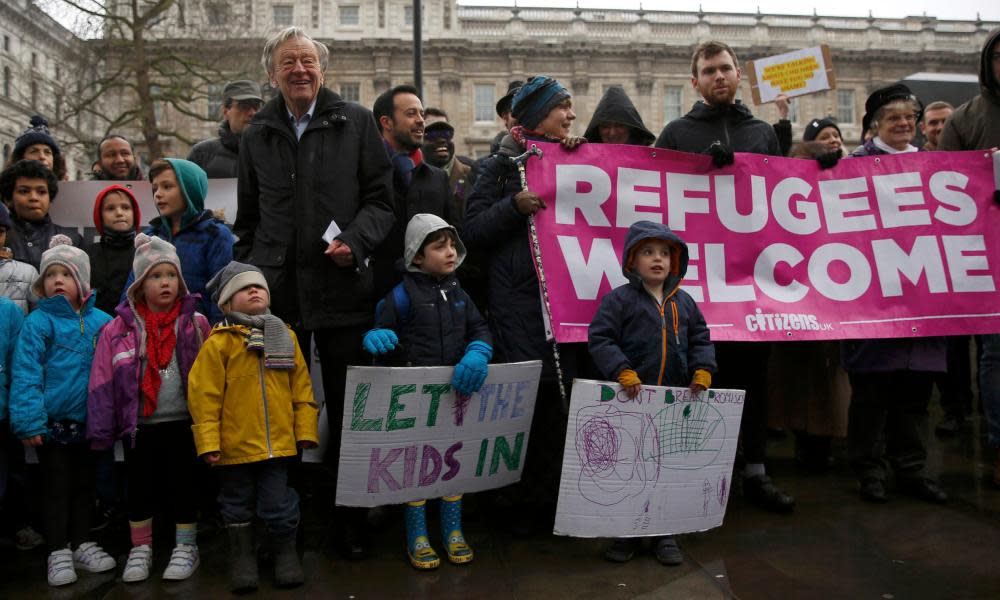First vulnerable child refugee arrives in UK from Greece under Dubs scheme

The first vulnerable child refugee stranded in Greece who qualifies for sanctuary under the Dubs amendment has arrived in the UK, more than a year after the government pledged to bring over hundreds of children.
The Home Office had accepted that the boy was vulnerable and eligible for transfer 16 months ago.
The Dubs amendment, part of the 2016 Immigration Act, was passed after a campaign to transfer 3,000 unaccompanied child refugees stuck in camps to Britain. There are more than 3,300 unaccompanied children in Greece, 11,186 in France and 13,867 in Italy. The Home Office agreed to resettle 480 under the Dubs scheme.
Conditions for lone children in Greece have been condemned by Human Rights Watch, which found filthy cells infested with bugs and vermin, sometimes without mattresses or access to showers.
Hammersmith and Fulham council in west London has stepped in to offer the boy a home and one of its social workers travelled to Greece to assess the child, who has lost contact with his family in Syria.
The boy, who is said to be deeply traumatised, was detained until last month in a police cell with no access to medical professionals, and forced to sleep on an inch-thick mattress on the ground. Police said the boy had repeatedly self-harmed, tried to kill himself and was at “imminent risk” of doing this.
According to Antonia Moustaka, a lawyer for the humanitarian agency Praksis, he spent more than 380 days in psychiatric clinics, 124 days in shelters for unaccompanied minors and six weeks in police detention.
The boy has been taken to a flat in Hammersmith provided by the local authority and will receive 24-hour care. Council officials will begin the process of assessing his long-term needs. A social worker was permitted to meet and accompany him through the airport when he landed on Friday morning.
A council spokesman said he appeared well but anxious. “We have a Greek-speaking mental health specialist social worker with him who worked with him in Greece,” he said.
The council is already accommodating and supporting 13 Dubs children from France.
George Gabriel, the project lead at the charity Safe Passage, said: “There are more than 3,300 unaccompanied children in Greece and only 1,130 spaces in shelters. The winter is bitterly cold and conditions are getting worse.
“Over a year and a half ago, the Dubs amendment brought hope that hundreds of these kids would be brought to safety. It has been appalling to watch these minors wait, month after month, on bureaucratic delays.”
Hammersmith and Fulham council’s leader, Steve Cowan, said: “We worked closely with Safe Passage, who alerted us to this case. This child has a legal right to come to Britain and deserves so much more.”
Josie Naughton of the charity Help Refugees said: “While we are thrilled to hear of this child being brought to safety, we are heartbroken at how long it has taken. One child in two years is unacceptable under any circumstances.’
Naughton said Help Refugees, Safe Passage and the Refugee Rights Data Project had written a joint letter to the home secretary demanding the immediate identification, assessment and transfer of child refugees under the Dubs amendment, to meet the government’s target of 480.
A Home Office spokesperson said: “We remain committed to transferring 480 children from Europe to the UK under section 67 of the Immigration Act. We have accepted further referrals this year and transfers are ongoing. We will continue to work closely with EU partners and local authorities to transfer eligible children here quickly and safely.
“Our wider focus remains helping those in need of international protection in the region, which is why we have committed to resettle up to 23,000 refugees from the region – almost 9,000 are already rebuilding their lives in the UK – and the government has pledged £2.46bn to the humanitarian response to the Syria conflict.”

 Yahoo News
Yahoo News 
